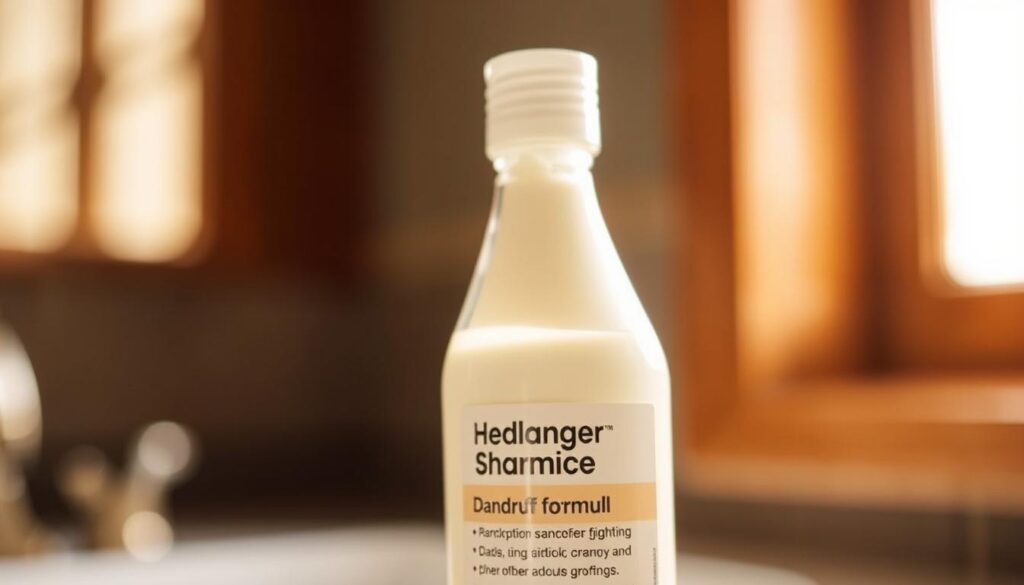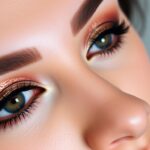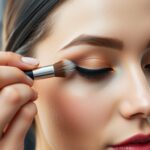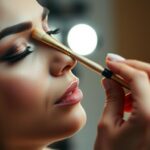Shampoo for Dandruff : Ever found yourself secretly brushing white flakes off your shoulder during an important meeting? You’re not alone. About 50% of adults deal with dandruff at some point, making it a common scalp issue that can hurt your confidence.
Choosing the right anti-dandruff shampoo is more than just getting rid of embarrassing white specks. It’s about making your scalp healthy again and feeling confident. With the right shampoo, you can see big improvements in just one use.
Today’s anti-dandruff shampoos are advanced solutions that tackle both symptoms and causes of scalp irritation. Whether you have occasional flaking or persistent dandruff, there’s a shampoo out there to change your hair care game.
In this guide, we’ll look at the best dandruff shampoos. We’ll cover their ingredients, benefits, and how they can help you get a healthier, flake-free scalp. Say goodbye to embarrassing dandruff and hello to beautiful, confident hair.
Table of Contents
Understanding Dandruff: Causes and Symptoms
Dandruff is a common scalp condition that affects about 50% of adults worldwide. If you have a flaky scalp, you’re not alone. Knowing the causes and symptoms can help you find the right treatment.
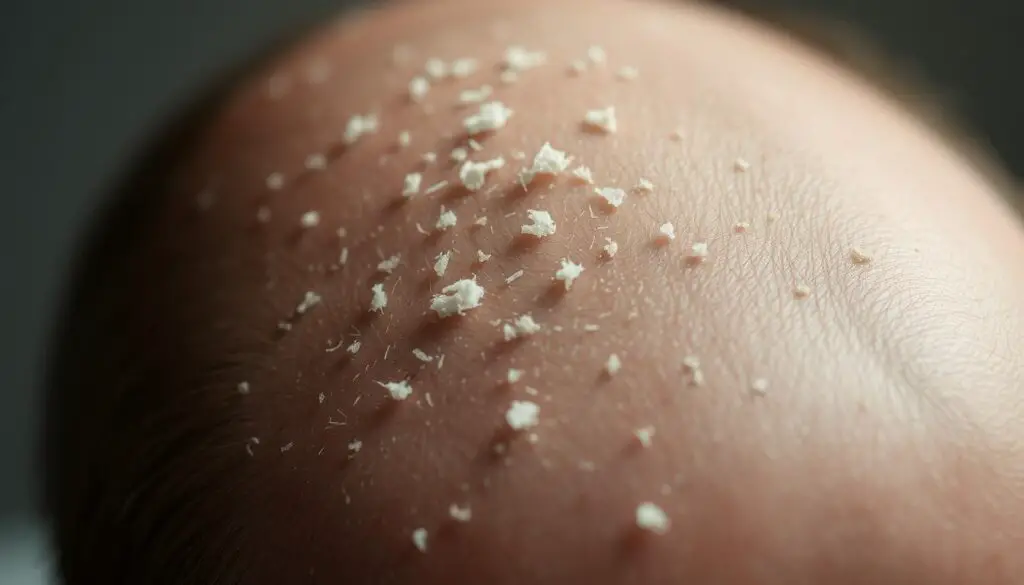
Dandruff isn’t just about white flakes. It’s a complex condition caused by many factors. These can make your scalp itchy and uncomfortable. While many confuse dandruff with a dry scalp, they’re different and need different treatments.
What Causes Dandruff?
- Overgrowth of malassezia yeast on the scalp
- Increased skin oil production
- Hormonal changes during puberty
- Emotional stress
- Cold and dry weather conditions
Recognizing Dandruff Symptoms
Identifying dandruff early can help manage it better. Look out for these signs:
- Oily, white or yellowish flakes
- Persistent scalp itching
- Irritated scalp patches
- Potential hair loss in severe cases
“Dandruff is more than just a cosmetic issue – it’s a signal that your scalp needs attention.” – Dermatology Experts
Interesting fact: Men are more likely to experience dandruff due to typically oilier skin. The condition often emerges around puberty when oil gland production increases.
When to Seek Professional Help
If your dandruff doesn’t improve after 2-3 weeks of over-the-counter treatments, see a dermatologist. Look out for signs like skin discoloration, bleeding, or infection.
How Shampoo Can Help with Dandruff
Dandruff is a common scalp condition that affects nearly 50% of people worldwide. Understanding how specialized hair care products combat this issue can help you manage seborrheic dermatitis more effectively.
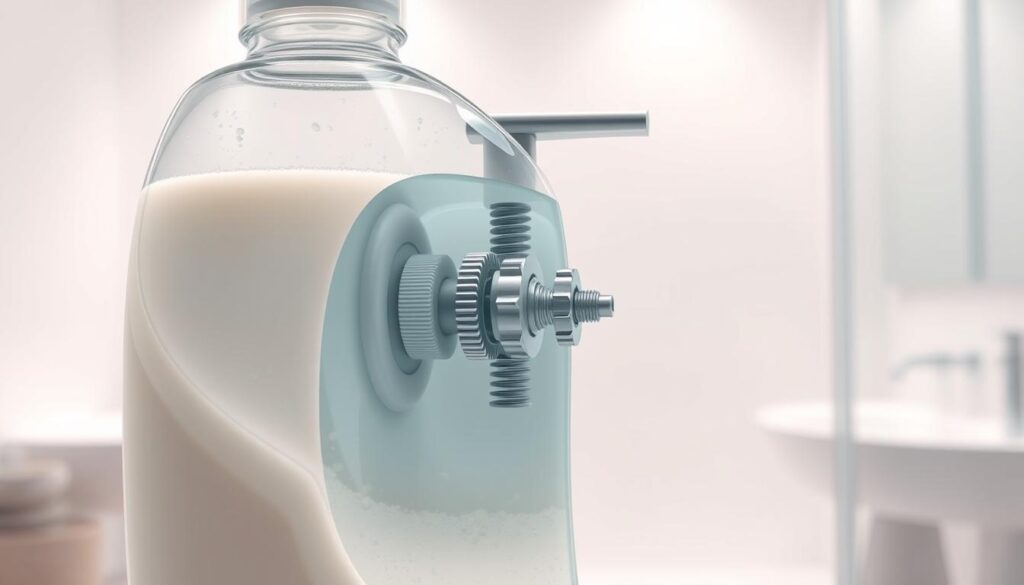
Dandruff shampoos work through specific mechanisms to address scalp health. These hair care products target the underlying causes of flaking and irritation by using carefully selected ingredients.
Mechanism of Action for Dandruff Control
The primary strategies for fighting dandruff include:
- Controlling fungal growth on the scalp
- Reducing inflammation
- Slowing down skin cell shedding
- Balancing scalp microbiome
Key Ingredients That Combat Dandruff
Effective dandruff shampoos typically contain powerful active ingredients:
- Pyrithione Zinc: Antifungal agent that reduces scalp microorganisms
- Ketoconazole: Targets fungal overgrowth directly
- Salicylic Acid: Helps remove dead skin cells and reduce scaling
“Choosing the right shampoo can significantly improve your scalp health and reduce dandruff symptoms.”
For optimal results, dermatologists recommend leaving medicated shampoos on the scalp for approximately 5 minutes before rinsing. This allows active ingredients to work effectively against seborrheic dermatitis and related scalp conditions.
Types of Dandruff Shampoo to Consider
Finding the right shampoo for dandruff can be tough with so many options. Knowing the different types of anti-dandruff shampoos helps you pick the best one for your scalp.
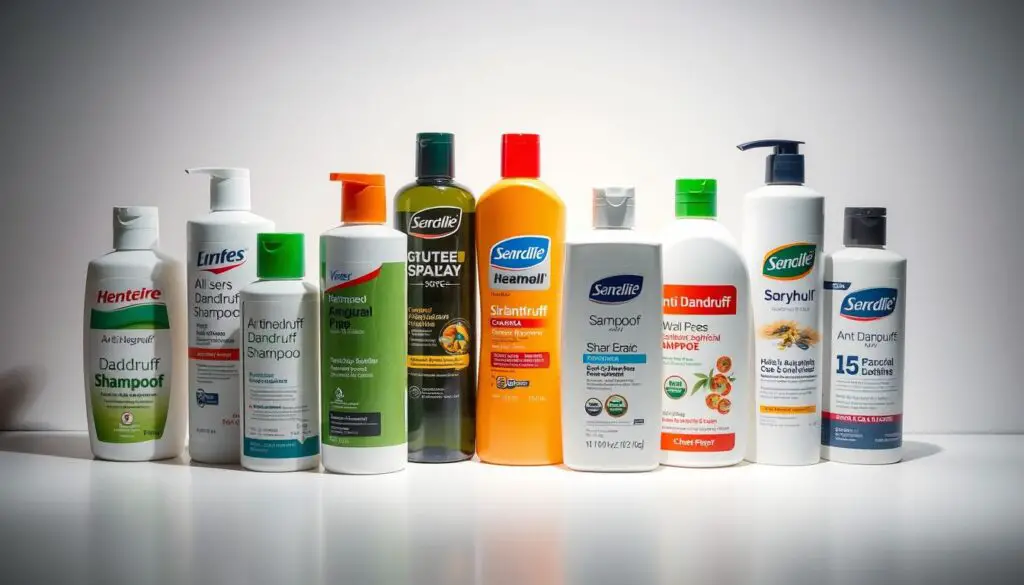
Dandruff affects about 50% of adults. It’s important to find a targeted solution. Let’s look at the main types of dandruff shampoos:
Anti-fungal Shampoos
Anti-fungal shampoos target the main cause of dandruff: the Malassezia fungus. These shampoos can cut fungal presence by up to 90%. They use ingredients like:
- Ketoconazole
- Pyrithione zinc
- Selenium sulfide
Anti-inflammatory Shampoos
Anti-inflammatory shampoos are key when your scalp is always irritated. They calm inflammation and reduce itching. They can also slow down skin cell turnover by up to 35%.
Natural Dandruff Shampoos
Natural anti-dandruff shampoos are a gentler choice. They use botanicals like tea tree oil. This oil has antimicrobial properties without harsh chemicals.
“Your scalp health is a reflection of your overall wellness” – Dermatology Insights
The global anti-dandruff shampoo market was worth $600 million in 2020. This shows how much people need good scalp care solutions. By knowing about these shampoo types, you can choose the right one for your dandruff.
Key Ingredients to Look For in Dandruff Shampoo
Finding the right dandruff shampoo can be tough with so many options. Knowing the best ingredients can help fight scalp problems better.
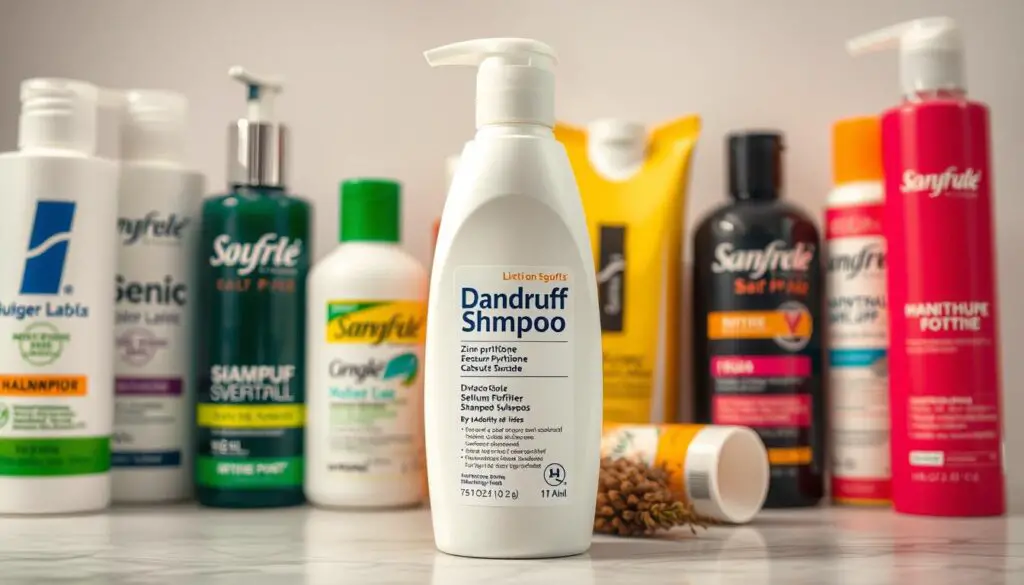
Dandruff affects about 50% of adults, making good treatment key. Let’s look at the top ingredients for managing this common scalp issue.
Pyrithione Zinc: A Powerful Anti-Dandruff Agent
Pyrithione zinc is a standout in fighting dandruff. It works by:
- Reducing fungal growth on the scalp
- Controlling sebum production
- Minimizing skin cell turnover
Studies show pyrithione zinc can improve scalp health by up to 70%. It’s a top pick for dandruff management.
Salicylic Acid: Exfoliation and Relief
Salicylic acid is great for dandruff-prone scalps. It helps by:
- Removing dead skin cells
- Reducing scalp inflammation
- Preventing flakiness
Research shows salicylic acid can cut flakiness by about 50% with regular use.
Additional Effective Ingredients
Other ingredients can also help scalp health:
- Ketoconazole – Antifungal properties
- Tea Tree Oil – Natural antibacterial agent
- Neem – Reduces scalp irritation
“The right ingredients can transform your scalp health and restore confidence.”
Keep in mind, results can vary. Talking to a dermatologist can help find the best dandruff treatment for you.
Popular Dandruff Shampoo Brands
Finding the right shampoo for dandruff can really change your scalp health. There are many top-rated shampoos that fight white flakes well.
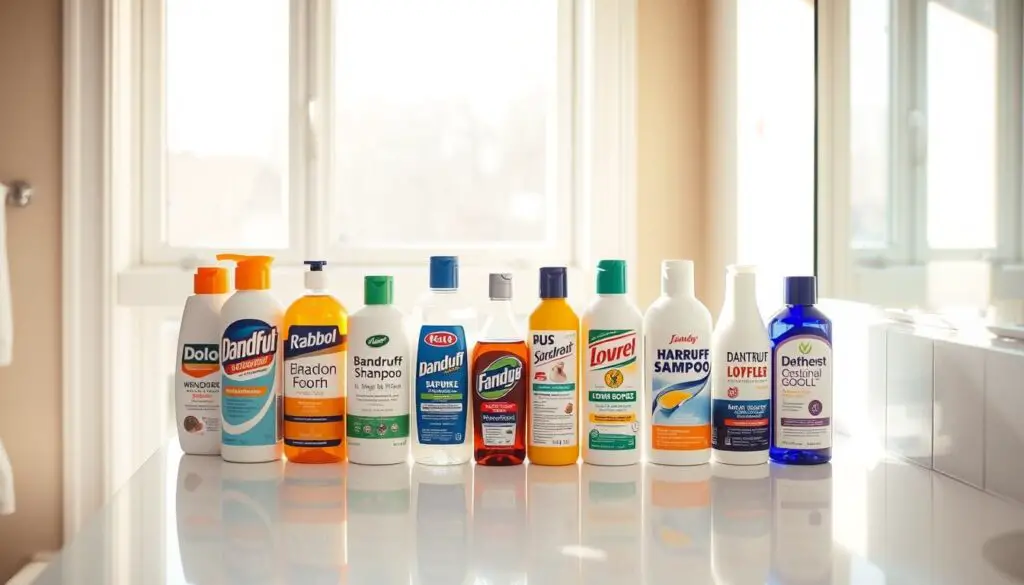
Head & Shoulders: Trusted Dandruff Defense
Head & Shoulders Clinical Strength Dandruff Defense Shampoo is a strong choice. Dermatologist-recommended selenium sulfide fights dandruff at its root. You can expect:
- Immediate flake reduction
- Scalp protection
- Clinically proven effectiveness
Nizoral: Powerful Anti-Fungal Treatment
Nizoral is a strong ally against dandruff. It uses 1% Ketoconazole to fight fungal growth that irritates the scalp. Use it:
- Every three days
- For 2-4 weeks
- Then use it every two weeks
Neutrogena T/Gel: Therapeutic Approach
Neutrogena T/Gel uses coal tar extract, approved by the FDA for dandruff. Use it a couple of times a week for deep cleaning and scalp healing.
Selsun Blue: Maximum Strength Solution
Selsun Blue Medicated Dandruff Shampoo is a strong choice with 1% selenium sulfide. It’s affordable at $8 and targets tough dandruff.
“Not all dandruff shampoos are created equal. Finding the right one can transform your scalp health.” – Dermatology Expert
When picking a shampoo for dandruff, think about your scalp’s needs and the ingredients that work best for you.
How to Choose the Right Dandruff Shampoo
Finding the perfect dandruff shampoo can be tricky. About 50% of adults deal with dandruff at some time. It’s key to pick the right hair care for your scalp.
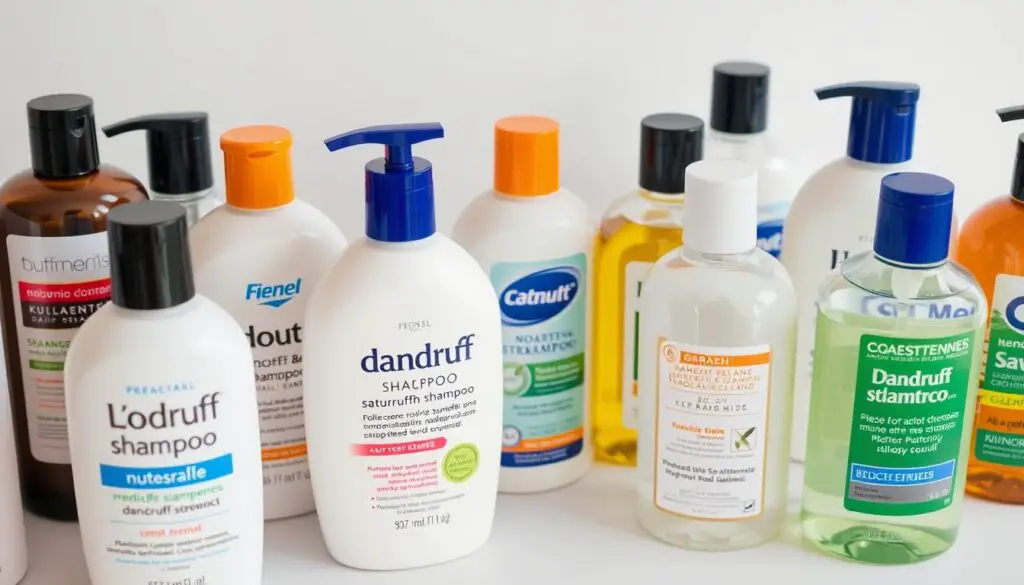
Your scalp care journey begins with knowing your needs. Not all dandruff shampoos are the same. You need to find the right one for you.
Understanding Your Scalp Type
Different scalp types need different treatments. Think about these important points:
- Oily scalp: Look for clarifying formulas
- Dry scalp: Seek out moisturizing ingredients
- Sensitive scalp: Choose gentle, hypoallergenic options
- Color-treated hair: Select color-safe dandruff solutions
Assessing Dandruff Severity
Dandruff can vary a lot. Studies show that using the right shampoo can cut flakes by up to 85% in four weeks.
Patch Testing New Products
Always do a patch test before using a new product. This step can prevent allergic reactions. About 15% of users get scalp dryness or irritation from new products.
“Know your scalp, know your solution.” – Dermatology Experts
Dermatologists say to see a specialist if dandruff doesn’t go away with over-the-counter treatments. Your scalp health is worth getting professional advice on.
How Often Should You Wash with Dandruff Shampoo?
Managing your scalp care routine with dandruff treatment needs a smart plan. Knowing when to wash can greatly help control dandruff and keep your scalp healthy.

- For seborrhoeic dermatitis: Use dandruff shampoo twice a week for 2-4 weeks
- After initial treatment, reduce to once every 1-2 weeks for prevention
- For persistent conditions, consult a dermatologist for personalized advice
Recommended Frequency for Usage
Your dandruff treatment frequency depends on many things, like your hair type and scalp condition. Daily shampooing isn’t always necessary. Most people can manage dandruff by:
- Using anti-dandruff shampoo 2-3 times per week
- Alternating with regular shampoo on other days
- Adjusting based on individual scalp response
Signs It’s Time to Change Shampoos
Look out for these signs that you might need to change your dandruff treatment:
- Reduced effectiveness after consistent use
- Increased scalp irritation
- No improvement in dandruff symptoms after 4-6 weeks
- New scalp issues emerging
“Scalp care is not one-size-fits-all. Listen to your scalp and be prepared to adjust your routine.”
Remember, everyone’s scalp is different. Try new things carefully and watch how your scalp reacts to different treatments.
Dandruff Shampoo for Sensitive Scalps
Dealing with dandruff can be tough, especially if your scalp is sensitive. Finding the right shampoo is key. You need to know how to care for your scalp.
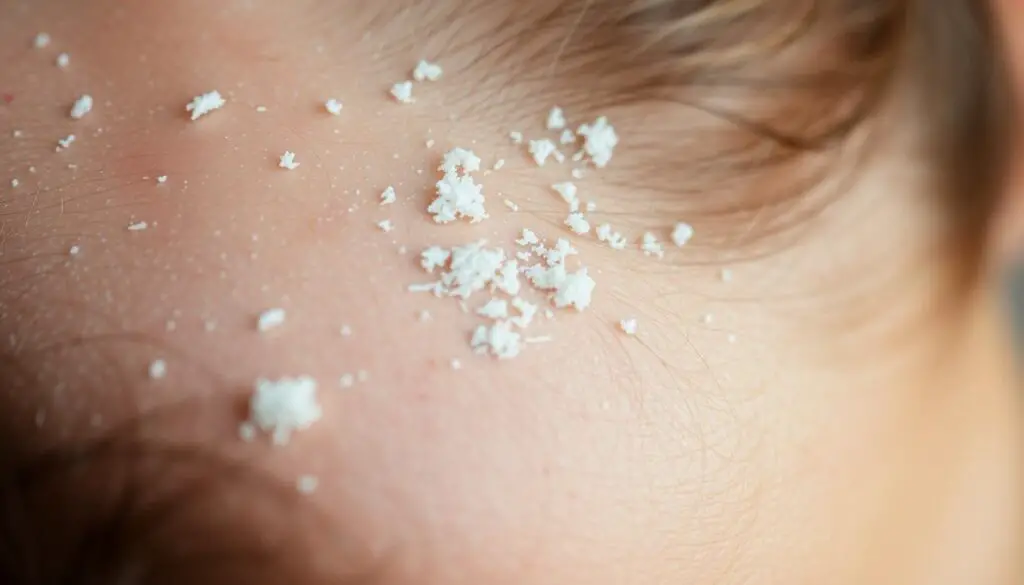
When you have a sensitive scalp, picking the right shampoo is crucial. Not all dandruff shampoos are created equal. This is especially true for those with delicate scalp conditions.
Choosing Mild Formulations
For sensitive scalps, look for shampoos with gentle ingredients. They should fight dandruff without irritating your skin. Key features include:
- Sulfate-free formulations
- Hypoallergenic ingredients
- No harsh chemical additives
- Natural anti-fungal components
Best Practices for Sensitive Skin
“Gentle care is the foundation of effective scalp treatment.”
When picking a shampoo for dandruff on sensitive scalps, keep these tips in mind:
- Patch test new products before full application
- Use lukewarm water when washing
- Limit washing to 2-3 times per week
- Choose products with soothing ingredients like aloe vera
Some good ingredients for sensitive scalp care include zinc pyrithione, tea tree oil, and salicylic acid in low amounts. These can help manage dandruff while keeping your skin calm.
Combining Shampoo with Other Treatments
Dealing with dandruff needs more than just a special shampoo. It’s important to use many methods to care for your scalp and hair.
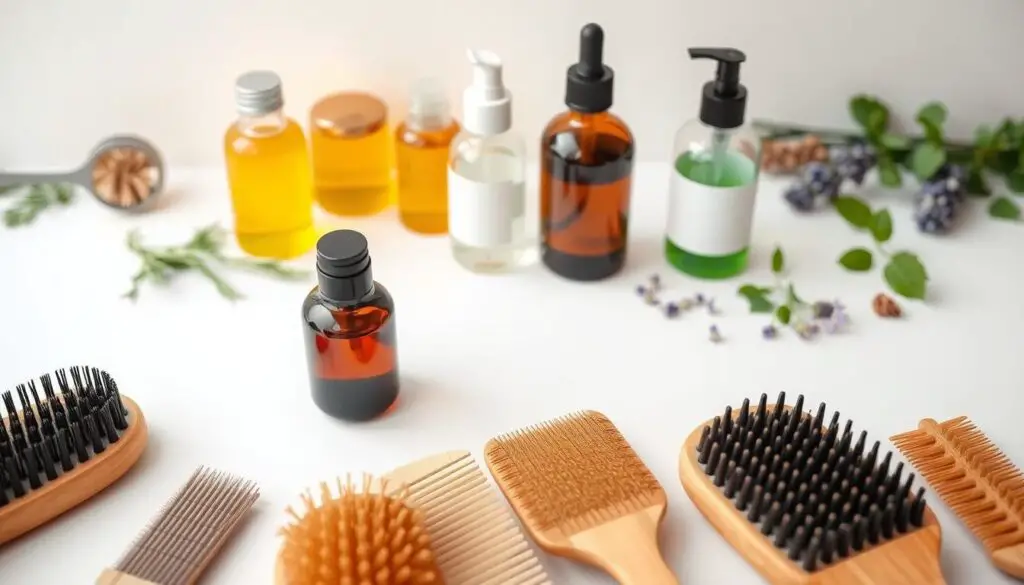
Improving your scalp health means using a complete plan to fight dandruff. Studies show that almost half of the world’s people will get dandruff at some point. So, it’s key to know how to treat it fully.
Complementary Scalp Treatments
- Tea tree oil treatments
- Coconut oil scalp masks
- Probiotic supplements
- Natural leave-in conditioners
Lifestyle Changes for Scalp Health
Making some lifestyle changes can really help with dandruff:
- Manage stress with meditation or yoga
- Eat foods full of nutrients
- Avoid harsh hair products
- Drink plenty of water
“A holistic approach to scalp care can transform your hair health from the root up.”
Dietary Recommendations
| Foods to Limit | Foods to Embrace |
|---|---|
| Refined carbohydrates | Probiotic-rich foods |
| Ultra-processed foods | Omega-3 fatty acids |
| Sugary beverages | Zinc-rich proteins |
| Fried foods | Antioxidant-rich vegetables |
Pro tip: If over-the-counter treatments don’t work in 2-3 weeks, see a dermatologist for custom scalp care plans.
Tips for Using Dandruff Shampoo Effectively
Managing dandruff is more than just picking the right shampoo. How you apply it can greatly improve your scalp care. This makes your anti-dandruff shampoo work better.
Effective dandruff shampoo application involves several key steps to maximize results:
- Wet your hair thoroughly with warm water
- Apply a small amount of shampoo directly to your scalp
- Massage gently using circular motions
- Ensure even distribution across the entire scalp
Proper Lathering Technique
The right lathering method is crucial. Use your fingertips, not your nails, to massage the shampoo into your scalp. This stimulates blood flow and helps the ingredients reach deep.
Timing: Maximizing Treatment Effectiveness
Dermatologists say to leave dandruff shampoo on for 3-5 minutes. This time lets the ingredients fight fungal growth and reduce inflammation.
“Patience is key when treating dandruff – give the shampoo time to do its job.”
Studies show consistent, proper application can cut dandruff symptoms by up to 70% in 4-8 weeks. By following these tips, you’ll get a healthier, flake-free scalp.
Pro tip: Rinse thoroughly with lukewarm water. This prevents residue buildup that could irritate your scalp.
Potential Side Effects of Dandruff Shampoos
When looking for ways to treat dandruff, it’s important to know about possible side effects. Most dandruff shampoos are safe, but some people might have unexpected reactions. These reactions need attention.
Common Reactions to Be Aware Of
Your scalp might react differently to different dandruff treatments. Some common side effects include:
- Scalp irritation and redness
- Dryness or increased skin sensitivity
- Temporary changes in hair texture
- Allergic skin reactions
Identifying Serious Reactions
Some dandruff shampoos, especially those with tar or selenium sulfide, can cause unique reactions. Look out for these warning signs:
| Reaction Type | Potential Symptoms |
|---|---|
| Mild Reactions | Temporary scalp tingling, mild itching |
| Moderate Reactions | Persistent redness, increased skin flaking |
| Severe Reactions | Intense burning, significant swelling |
When to Consult a Dermatologist
There are times when you should see a dermatologist for dandruff treatment. You might need to see a doctor if you have:
- Severe scalp inflammation
- Allergic reactions lasting more than 48 hours
- Significant hair loss
- Symptoms that worsen with continued product use
“Your scalp’s health is a reflection of your overall well-being. Always prioritize professional guidance when experiencing persistent issues.” – Dermatology Research Institute
Remember, individual responses to dandruff shampoos can vary widely. About 50% of adults get dandruff at some point. But, how well treatments work can differ for everyone. Being patient and watching your scalp closely is important to find the right treatment.
DIY Dandruff Remedies
Dealing with dandruff can be really tough. But, there are natural ways to help. You don’t need to spend a lot on products. Many good remedies are found in your kitchen or at the health store.
Essential Oils for Dandruff Control
Some essential oils are great for fighting dandruff and keeping your scalp healthy. Here are some of the best ones:
- Tea Tree Oil: It fights off fungus and reduces irritation
- Lemon Essential Oil: It balances your scalp’s pH and controls oil
- Coconut Oil: It moisturizes and has antibacterial properties
Home Remedies Worth Trying
There are many natural ways to treat dandruff that are also gentle. Try these:
| Remedy | Application Frequency | Benefits |
|---|---|---|
| Apple Cider Vinegar Rinse | Twice weekly | Balances scalp pH, reduces fungal growth |
| Baking Soda Treatment | Once per 4-5 washes | Exfoliates scalp, removes buildup |
| Honey Mask | Weekly | Antibacterial, moisturizing properties |
“Natural remedies can be powerful allies in your dandruff treatment journey.” – Scalp Care Experts
Keep in mind, everyone’s results are different. If your dandruff doesn’t get better or gets worse, see a dermatologist. They can give you advice tailored to your scalp.
Ongoing Maintenance for Dandruff Prevention
Managing scalp care is more than just occasional treatments. Your hair care product strategy should aim for long-term scalp health. It should also prevent dandruff from coming back.
To keep your scalp healthy, follow these important steps. They help reduce dandruff and improve hair health:
- Develop a consistent hair washing routine
- Select gentle hair care products
- Manage environmental and lifestyle triggers
- Monitor scalp health regularly
Adjusting Your Hair Care Routine
Your scalp care routine should match your hair and scalp type. Make these key changes:
- Use anti-dandruff shampoo 2-3 times per week
- Alternate with mild, moisturizing shampoos
- Avoid excessive heat styling
- Protect scalp from sun exposure
Long-term Strategies for Healthy Scalp
Using sustainable practices can greatly reduce dandruff. Focus on holistic methods that tackle the root causes.
“Prevention is always better than cure when it comes to scalp health.”
| Strategy | Benefits |
|---|---|
| Balanced Diet | Supports scalp nutrition |
| Stress Management | Reduces inflammation triggers |
| Hydration | Maintains scalp moisture balance |
| Regular Scalp Exfoliation | Removes dead skin cells |
By adding these strategies to your hair care routine, you can manage dandruff well. Remember, being consistent is crucial in preventing scalp problems from coming back.
Final Thoughts: Finding the Best Shampoo for You
Finding the right shampoo for dandruff can be tough, with so many choices. Remember, finding the best scalp care is a personal journey. Dandruff affects up to 50% of people, so you’re not alone in your search.
Personalizing Your Dandruff Treatment
Your scalp health is unique, and what works for one might not work for another. Think about your hair type, scalp sensitivity, and dandruff symptoms when picking a shampoo. Brands like Head & Shoulders, Nizoral, and Dove have different formulas for various scalp issues.
Embracing Consistency for Scalp Health
Being patient is important when dealing with dandruff. Using an anti-dandruff shampoo regularly, even once a week, can prevent symptoms from coming back. Give your chosen product a few weeks to see results before trying something else. With consistent care and the right shampoo, you can get a healthier, flake-free scalp.
